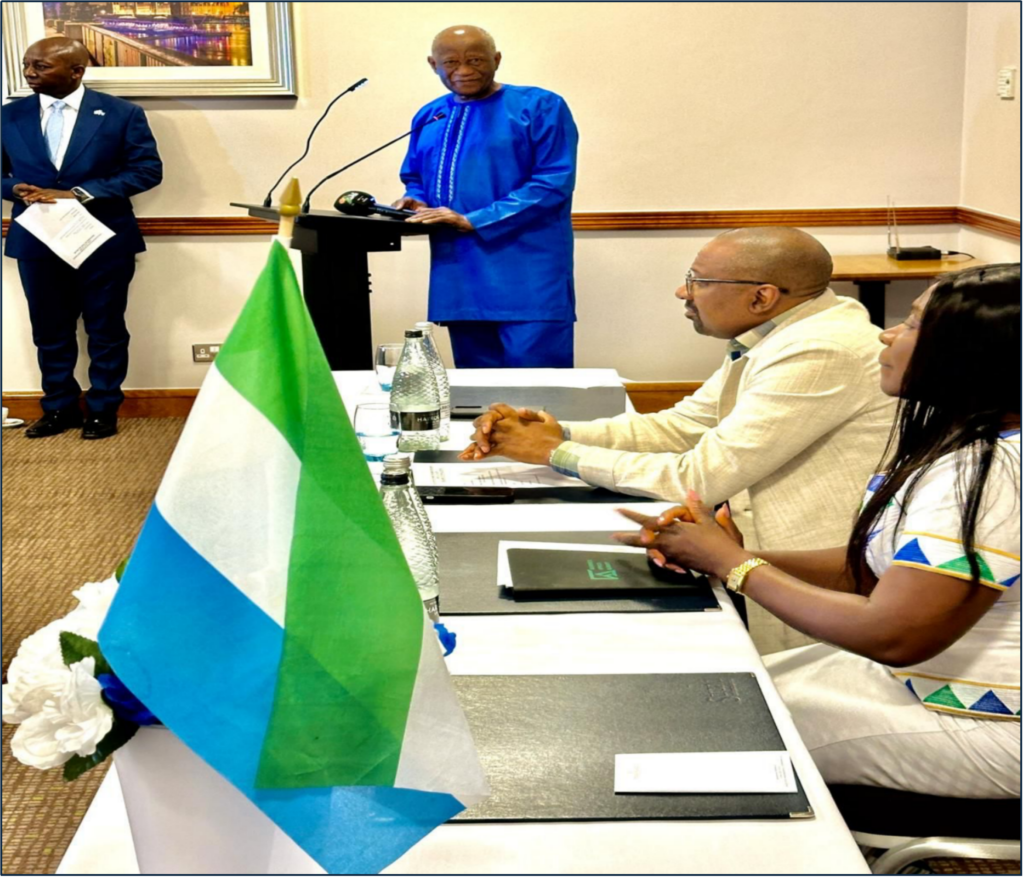The Honorable Vice President of the Republic of Sierra Leone, Dr. Mohamed Juldeh Jalloh, has engaged a cross-section of Sierra Leoneans in London.
During the meeting at the Strand Palace Hotel, held on Friday, 12th July 2024, Vice President Dr Juldeh Jalloh spoke in-depth about the efforts of the government under the direction of His Excellency President Julius Maada Bio to reposition and elevate Sierra Leone, both domestically and on the international stage.
The honourable Vice President also acknowledged the challenges incurred amid the positive forward strides.
This meeting followed a session with the Sierra Leone High Commissioner, Dr Morie Manyeh, and staff at the Sierra Leone High Commission on Eagle Street, where the discussions included a look at strategic engagements required to further strengthen the Sierra Leone-UK relations. The Vice President shared his insights and listened to suggestions from the High Commission on deepening bilateral ties, with a long-standing and trusted partner on the global stage.
In his address to the Sierra Leonean community at the Strand Palace Hotel later on in the evening, Vice President Jalloh discussed the challenging global environment, noting the twin impacts of COVID-19 and the Ukraine war on all sectors in most countries.
He went on to point out that despite the challenges, Sierra Leone has registered commendable scores in areas such as education, healthcare, and agriculture, emphasizing His Excellency President Bio’s Human Capital Development vision as the mapping light illuminating the nation’s way forward.
These strides include a massive government-funded education drive for approximately 2.7 million children, investments in healthcare, and initiatives to promote women’s and children’s rights, as well as significant work being done to strengthen good governance and the rule of law.
The Vice President also detailed the government’s ongoing efforts to subsidize essential services and commodities such as electricity, rice, and petroleum products. “Despite global economic challenges, the government continues to prioritize social infrastructural development”, he maintained. This is evidenced in areas such as the massive increase in the education budget to 22% of GDP, and the healthcare budget from 6% in 2018 to 11.2% currently.
Dr Jalloh elaborated on the necessary, but heavy financial burden borne by the government to shield the population from extreme economic hardships, including subsidizing electricity costs and tariffs on communication. He noted significant improvements in healthcare, such as the reduction in child and maternal mortality rates, and partnerships with organizations like UNICEF to further enhance maternal and child health.
Throughout the Vice President’s delivery, it was clear that Agriculture and Education remain a top priority, with increasing enrollment in schools and universities, especially among female students in science fields. Government support also extends to technical and vocational training, aiming to equip young people with practical skills appropriate to the needs of society.
The international community, he maintained, has recognized Sierra Leone’s progress, highlighted by tangible actions which have seen President Bio’s co-chairing of the global educational transition with the UN Secretary-General, as well as in Sierra Leone’s position as Chair of the C-10 at the United Nations.
The Vice President emphasised the strategic importance of strengthening relations with the global community, which can bring real results. He spoke about the establishment of a French diplomatic station in Freetown, which has made it possible for Sierra Leoneans to obtain French and Schengen visas in Freetown instead of travelling to other countries for that purpose.
These diplomatic efforts have opened new avenues for business and financial support, as well as laid the foundations for further possibilities.
Dr Jalloh assured the audience of the government’s commitment to maintaining currency stability and creating a conducive environment for business growth. He outlined initiatives such as the National Investment Board, aimed at removing obstacles in conducting business in Sierra Leone, as well as providing other incentives to encourage business growth. He also spoke, at length, about the FEED SALONE program, a major government policy initiative, aimed at achieving food self-sufficiency and reducing dependency on food imports.
The Vice President highlighted the Gender Equality and Women’s Empowerment (GEWE) Act, as well as internationally acclaimed efforts to combat discrimination and violence against women and girls. He spoke positively about developments in the rising tourism sector. He also addressed some of the challenges in that sector, which impacts other areas, including the high cost of travel to Sierra Leone and ongoing efforts to attract more airlines to the country.
Dr. Jalloh concluded by expressing gratitude to the diaspora for their vital steadfast support and encouraged them to continue their good efforts. He praised the resilience and tolerance of Sierra Leoneans and emphasized the importance of national cohesion.
The session included questions from members of different sectors, including executives of charity organizations and heads of school associations based in the UK, with discussions on reducing overhead costs for local NGOs and taking further steps that could make it easier to clear goods at the port in Freetown. The Vice President provided contact information for relevant government officials working on these issues and promised to follow up on the issues raised in the meeting.
The occasion turned into an engaging and productive session, with representatives from across the Sierra Leonean community in the United Kingdom thronging around the Vice President for group and individual photos and for more informal chat sessions.
